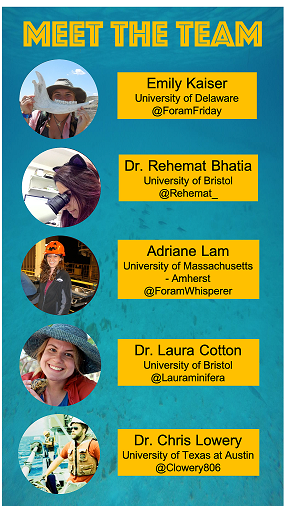Rehemat Bhatia, Adriane Lam, Emliy Kaiser, Chris Lowery and Laura Cotton on Foram Week – a new outreach initiative
 Twitter has been a powerful tool for today’s scientists to broaden the audiences that their research reaches. Especially so for microfossils, which are often overlooked. Foraminifera, single-celled zooplankton with a calcareous shell, have an extensive fossil record (back to the Cambrian) and can help to tell us about evolution and past climates, including geologically warm intervals which we use as future climate analogues. Often, this group of protists are overshadowed in the public sphere, with large extinct animals like T. rex and C. megalodon capturing the minds of adults and children alike.
Twitter has been a powerful tool for today’s scientists to broaden the audiences that their research reaches. Especially so for microfossils, which are often overlooked. Foraminifera, single-celled zooplankton with a calcareous shell, have an extensive fossil record (back to the Cambrian) and can help to tell us about evolution and past climates, including geologically warm intervals which we use as future climate analogues. Often, this group of protists are overshadowed in the public sphere, with large extinct animals like T. rex and C. megalodon capturing the minds of adults and children alike.
This drove one of us, Emily Kaiser (@foramfriday, University of Delaware) to send out a seemingly innocuous tweet while watching Shark Week (a week long feature of shark based programming on the Discovery Channel): “How do we make microfossils such as foraminifera as intense and interesting as Shark Week?” Overnight, that tweet caught on and suddenly the twitter foraminifera community was brainstorming ideas. Dr Rehemat Bhatia (@rehemat_, University of Bristol) and Adriane Lam (@foramwhisperer, UMass Amherst) joined the cause and, after some intense planning, Foram Week (@ForamWeek) was scheduled for September 9-13th, 2019. The official Twitter page, complete with logo, was set up on August 1, 2019. Using our Twitter and conference networking skills, we advertised Foram Week far and wide.
The main purpose of Foram Week was to educate the public, and other researchers, as to what foraminifera are and how their fossil record is utilised to interpret past climates and evolutionary dynamics. During Foram Week, many topics were discussed to meet these goals, including aspects of paleoceanography, zooplankton ecology, biostratigraphy, and more. We recruited two other micropaleontologists, Dr. Laura Cotton (@Lauraminifera, University of Bristol) and Dr. Chris Lowery (@Clowery806, University of Texas at Austin) to help with social media strategies and to share their knowledge of foraminifera.
Dr. Cotton did a larger benthic foraminifera takeover day, filled with foraminiferal facts. Following the style of numerous single-elimination voting-based popularity tournaments on twitter, Dr. Lowery began and oversaw the Best Foram Tournament. With hashtags like #TeamPlanktic and #TeamBenthic flooding news feeds, and many scientists forced to choose between two of their favourite foraminiferal species, Planulina wuellerstorfi came out on top. Perhaps most surprisingly, a Cretaceous planktic foraminifera, Rotalipora cushmani, survived all the extinctions and came in second place. The event was a success, which garnered hundreds of votes and fostered countless discussions of which foraminifera species is the best (in our opinion, they’re all awesome).
During Foram Week, the account averaged almost 40,000 impressions (i.e., times people saw a tweet from the account) per day, and has, as of mid-October, 478 followers – 400 of which were gathered in just one week. Most of the most-viewed tweets were related to the Best Foram Tournament, indicating the importance of audience participation in driving engagement - although the top tweet overall was a CT scan of a Nummulites. Notable followers include the AGU, AGU’s Eos, Cushman Foundation, The Micropalaeontological Society, Geological Society of America, Geological Society of London, and many museums around the world. Laura’s tweet about her foraminifera related encounter with Alice Cooper also got many likes from those following her larger benthic takeover day.
Based on these metrics, Foram Week was clearly a success! This event helped strengthen a twitter community of micropaleontologists and informed people about foraminifera. This highlights the importance of collaboration in the success of outreach projects. The five of us, researchers from different career stages (MSc student through to Associate Professor), managed to lead a highly successful Twitter campaign, which attracted a global audience with minimal (<1 month) planning.
The organizers thank all of our followers and the Twitter community for supporting Foram Week. Stay tuned on our page, @ForamWeek, for updates regarding next year’s event!